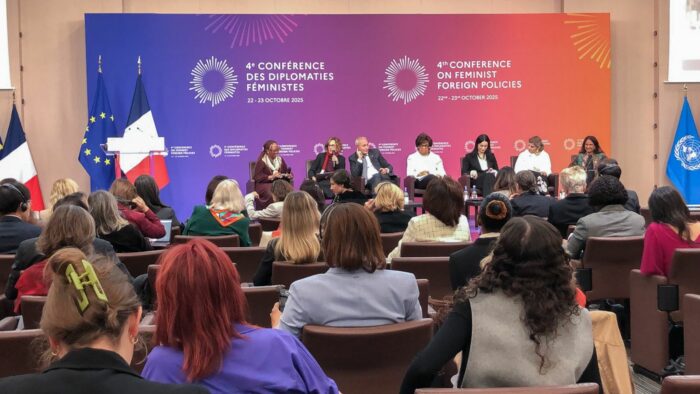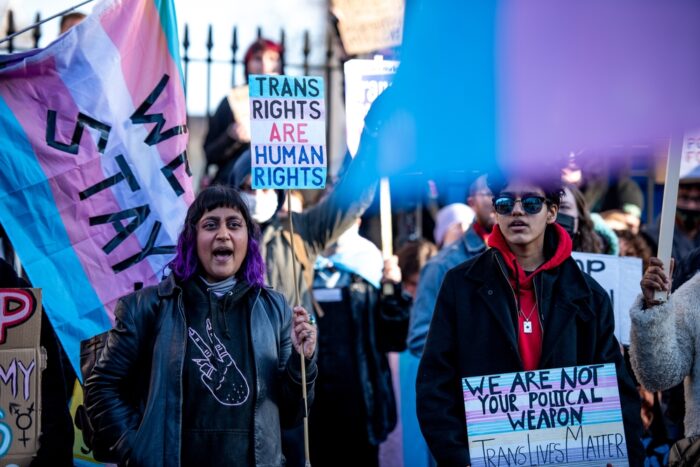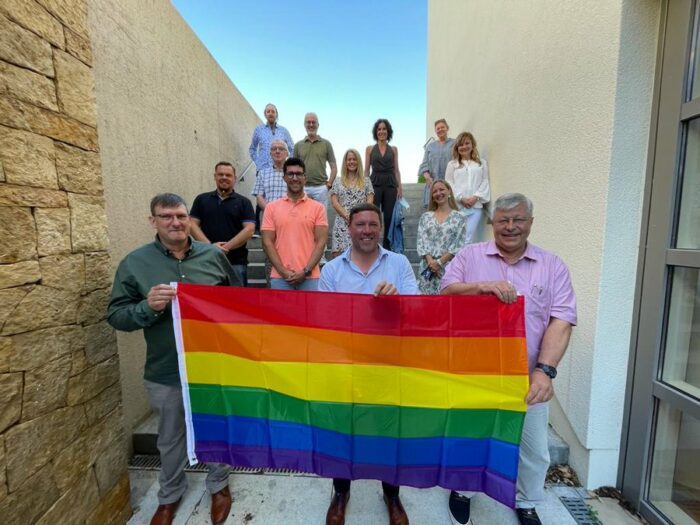Find all related Progressive Post
Progressive Post

For more than just the past decade, far-right parties and mobilisations have been prominently – but selectively – championing women’s rights in public discourse. Considering their otherwise salient anti-gender rhetoric, their increasingly traditionalist family policies, and often blatant disdain for feminism, the question of whether they seriously care arises.
To some extent, ‘women’s rights’ have been a staple within global far-right discourse, both in party politics and in non-parliamentary mobilisations, for longer than the recent rise in populist radical right parties over the last decade. However, more recently, an increasing number of women leaders and MPs representing these parties, a growing presence of specifically female mobilisations, and a steadily closing gender gap in voter support, have transformed the image of the far-right. This egalitarian ‘face-lift’ has added to the confusion for many and necessitates posing the question of their intention anew: do they actually care?
An examination of the recurrent invocations of women’s rights across Europe’s far-right reveals a shared narrative that gives insight into what is behind them. In this narrative, an overarching juxtaposition between a ‘civilised’, enlightened and egalitarian Europe and a racialised, inherently backward, and misogynistic Islam or broader Global South is created. It is narrated through the fear of the ‘cultural other’, who is sometimes described as Muslim, sometimes as Roma or migrant of colour, depending on the regional context. The far-right portrays them as ‘carriers’ of patriarchal violence and values, threatening the long-won rights and liberties of women in the countries that welcome them. As a symbol of this looming demise, the figure of the ‘veiled muslim woman’ is frequently misused: unlike the ‘native women’ whose liberties must be protected, the ‘migrant women’ have yet to be liberated.
Although not new, this crisis narrative gained traction in far-right and even mainstream politics, particularly following the so-called ‘refugee crisis’ and the mass sexual attacks during New Year’s Eve in Cologne in 2015, far beyond Germany’s and even Europe’s borders. Even today, almost ten years later, the same actors continue to instrumentalise these events as cautionary tales.
However, it is important to highlight, that this racialisation of specifically sexual, and more generally patriarchal violence serves two distinct purposes within far-right agendas. Primarily, and obviously so, it aims to exclude racialised migrants by marking them as ‘culturally incompatible’, and, consequently, to call for their expulsion from the respective nations. Coincidentally, it positions women’s rights as the ‘gatekeepers’ of European societies and their identities as liberal, egalitarian nations. As a, possibly less obvious, result of this narrative, feminism is conveyed as a concluded project – as long as ‘the other’ is kept at a distance. The only women still in need of feminist intervention and equality policies are ‘their’ women: muslim women, migrant women, and women of colour. A task, the far-right frequently claims as their own in the name of ‘women’s rights’.
In this way, they reconcile discrediting feminism, while simultaneously affirming women’s rights through feminist rhetoric and female representation. In fact, the mobilisation of a supposed crisis of women’s rights, as a result of the immigration of ‘culturally other’ men, kills two birds with one stone. Studies indicate that the main incentive to vote for far-right parties in Europe is their anti-immigration stance and their rejection of multiculturalism. At the same time, ‘gender’ is an effective affective mobiliser, cutting across political issues, and serving as ‘symbolic glue’ between otherwise divergent, transnational mobilisations.
Returning to the initial question of whether the far right actually cares about women’s rights or not, the short answer is both yes and no. To elaborate, they do care about white, ‘native’ women. In some cases, this care might be limited to the women’s role as the ‘bearers of the nation’, while for others, such as the German AfD, a more complex image of national femininity, between traditionalism and modernism, is created.
However, from a feminist perspective, the issue is not necessarily whether they ‘mean’ this extremely limited conception of women’s rights and feminist topics, but rather the consequences it has for all women. Not only should we care, if women’s rights are co-opted for racist rhetoric and legislation, we must be wary of whitewashing gender-based violence, committed by ‘natives’ and threats to women’s rights by the very actors who claim to champion them, in circumstances that only serve their own agenda. Moreover, in light of the persistence of many systemic inequalities and gender-based issues, ranging from the gender pay gap, over contestations of abortion rights, to the shocking number of femicides in Europe and around the world, we reject the narrative of concluded emancipation. Women, who are not white, cis, heterosexual, or able-bodied are disregarded by the specific affirmation of women’s rights by far-right parties, at best. More often, they are actively excluded, antagonised and disenfranchised. ‘
To conclude with a quote by the feminist researcher Stefanie Boulila, the appropriation of women’s rights and partial adoption of feminist rhetoric by the far-right acts as a mere ‘liberal smokescreen’ to refute multiculturalism and to block further, much-needed progress that benefits all women.
Photo credits: Shutterstock.com/Pierre Teyssot
| Cookie | Duration | Description |
|---|---|---|
| cookielawinfo-checkbox-advertisement | 1 year | Set by the GDPR Cookie Consent plugin, this cookie is used to record the user consent for the cookies in the "Advertisement" category . |
| cookielawinfo-checkbox-analytics | 11 months | This cookie is set by GDPR Cookie Consent plugin. The cookie is used to store the user consent for the cookies in the category "Analytics". |
| cookielawinfo-checkbox-functional | 11 months | The cookie is set by GDPR cookie consent to record the user consent for the cookies in the category "Functional". |
| cookielawinfo-checkbox-necessary | 11 months | This cookie is set by GDPR Cookie Consent plugin. The cookies is used to store the user consent for the cookies in the category "Necessary". |
| cookielawinfo-checkbox-others | 11 months | This cookie is set by GDPR Cookie Consent plugin. The cookie is used to store the user consent for the cookies in the category "Other. |
| cookielawinfo-checkbox-performance | 11 months | This cookie is set by GDPR Cookie Consent plugin. The cookie is used to store the user consent for the cookies in the category "Performance". |
| csrftoken | past | This cookie is associated with Django web development platform for python. Used to help protect the website against Cross-Site Request Forgery attacks |
| JSESSIONID | session | The JSESSIONID cookie is used by New Relic to store a session identifier so that New Relic can monitor session counts for an application. |
| viewed_cookie_policy | 11 months | The cookie is set by the GDPR Cookie Consent plugin and is used to store whether or not user has consented to the use of cookies. It does not store any personal data. |
| Cookie | Duration | Description |
|---|---|---|
| __cf_bm | 30 minutes | This cookie, set by Cloudflare, is used to support Cloudflare Bot Management. |
| S | 1 hour | Used by Yahoo to provide ads, content or analytics. |
| sp_landing | 1 day | The sp_landing is set by Spotify to implement audio content from Spotify on the website and also registers information on user interaction related to the audio content. |
| sp_t | 1 year | The sp_t cookie is set by Spotify to implement audio content from Spotify on the website and also registers information on user interaction related to the audio content. |
| Cookie | Duration | Description |
|---|---|---|
| CONSENT | 2 years | YouTube sets this cookie via embedded youtube-videos and registers anonymous statistical data. |
| iutk | session | This cookie is used by Issuu analytic system to gather information regarding visitor activity on Issuu products. |
| s_vi | 2 years | An Adobe Analytics cookie that uses a unique visitor ID time/date stamp to identify a unique vistor to the website. |
| Cookie | Duration | Description |
|---|---|---|
| NID | 6 months | NID cookie, set by Google, is used for advertising purposes; to limit the number of times the user sees an ad, to mute unwanted ads, and to measure the effectiveness of ads. |
| VISITOR_INFO1_LIVE | 5 months 27 days | A cookie set by YouTube to measure bandwidth that determines whether the user gets the new or old player interface. |
| YSC | session | YSC cookie is set by Youtube and is used to track the views of embedded videos on Youtube pages. |
| yt-remote-connected-devices | never | YouTube sets this cookie to store the video preferences of the user using embedded YouTube video. |
| yt-remote-device-id | never | YouTube sets this cookie to store the video preferences of the user using embedded YouTube video. |
| yt.innertube::nextId | never | This cookie, set by YouTube, registers a unique ID to store data on what videos from YouTube the user has seen. |
| yt.innertube::requests | never | This cookie, set by YouTube, registers a unique ID to store data on what videos from YouTube the user has seen. |
| Cookie | Duration | Description |
|---|---|---|
| COMPASS | 1 hour | No description |
| ed3e2e5e5460c5b72cba896c22a5ff98 | session | No description available. |
| loglevel | never | No description available. |


